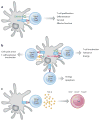Immune Tolerance for Autoimmune Disease and Cell Transplantation
- PMID: 26928211
- PMCID: PMC4947009
- DOI: 10.1146/annurev-bioeng-110315-020137
Immune Tolerance for Autoimmune Disease and Cell Transplantation
Abstract
The undesired destruction of healthy cells, either endogenous or transplanted, by the immune system results in the loss of tissue function or limits strategies to restore tissue function. Current therapies typically involve nonspecific immunosuppression that may prevent the appropriate response to an antigen, thereby decreasing humoral immunity and increasing the risks of patient susceptibility to opportunistic infections, viral reactivation, and neoplasia. The induction of antigen-specific immunological tolerance to block undesired immune responses to self- or allogeneic antigens, while maintaining the integrity of the remaining immune system, has the potential to transform the current treatment of autoimmune disease and serve as a key enabling technology for therapies based on cell transplantation.
Keywords: cell therapies; immunomodulation; inverse vaccines; nanotechnology; tolerance.
Conflict of interest statement
S.D.M. and L.D.S. have a financial interest in Cour Pharmaceuticals.
Figures


References
-
- Miller SD, Turley DM, Podojil JR. Antigen-specific tolerance strategies for the prevention and treatment of autoimmune disease. Nat Rev Immunol. 2007;7:665–77. - PubMed
-
- Tobias LD. A Briefing Report on Autoimmune Diseases and AARDA: Past, Present, and Future. Eastpointe, MI: AARDA; 2010.
-
- Shapiro AM, Lakey JR, Ryan EA, Korbutt GS, Toth E, et al. Islet transplantation in seven patients with type 1 diabetes mellitus using a glucocorticoid-free immunosuppressive regimen. N Engl J Med. 2000;343:230–38. - PubMed
Publication types
MeSH terms
Grants and funding
LinkOut - more resources
Full Text Sources
Other Literature Sources
Medical

